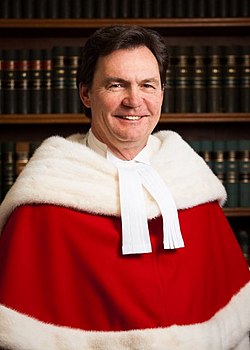| Supreme Court of Canada |
|---|
 |
 |
|---|
The Supreme Court of Canada is the highest court of Canada. It was established by the Parliament of Canada through the Supreme and Exchequer Court Act of 1875. [1] Since 1949, the Court has been the final court of appeal in the Canadian justice system. Originally composed of six justices (the Chief Justice of Canada and five puisne justices), the Court was expanded to seven justices by the creation of an additional puisne justice position in 1927, [2] and then to nine justices by the creation of two more puisne justice positions in 1949. [3]
Contents
- Justices
- Notes
- Timeline of justices
- Justices' birthplaces
- Notes 2
- Justices' legal backgrounds
- References
- Bibliography
- External links
The justices are appointed by the governor general on the advice of the prime minister. When a chief justice leaves office, the vacancy is traditionally filled by elevating an incumbent puisne justice to the position, which requires a separate appointment process. The first six justices of the Court were all appointed in 1875 by Governor General the Earl of Dufferin, on the advice of Prime Minister Alexander Mackenzie.
Of the nine justices, three positions are required by law to be held by judges who are either judges of the superior courts of Quebec, or members of the Bar of Quebec, at the time of their appointment. [4] [5] Traditionally, three of the remaining judges are appointed from Ontario, two from the four western provinces, and one from the Atlantic provinces. The judges from these provinces, other than Quebec, must have been a judge of a superior court, or a member of the bar of one of those provinces for ten or more years prior to the appointment. [6]
Justices hold office until age 75, during good behaviour. They are removable by the Governor General on address of the Canadian Senate and House of Commons. [7] When the Court was created in 1875, the justices had life tenure, but in 1927 this was converted to mandatory retirement at age 75. [8] Because the legislation did not contain a grandfather clause it immediately applied to any judge who was already over age 75 at the time it came into force. As a result, Justice John Idington, aged 86, was forced to retire from the Court.
Since the Supreme Court was created in 1875, 90 persons have served on the Court. The length of overall service on the Court for the 81 non-incumbent justices ranges from Sir Lyman Duff's 37 years, 101 days, to the 232-day tenure of John Douglas Armour. The length of service for the 9 incumbent justices ranges from that of Andromache Karakatsanis, 13 years, 352 days to Mary Moreau's 1 year, 336 days.


